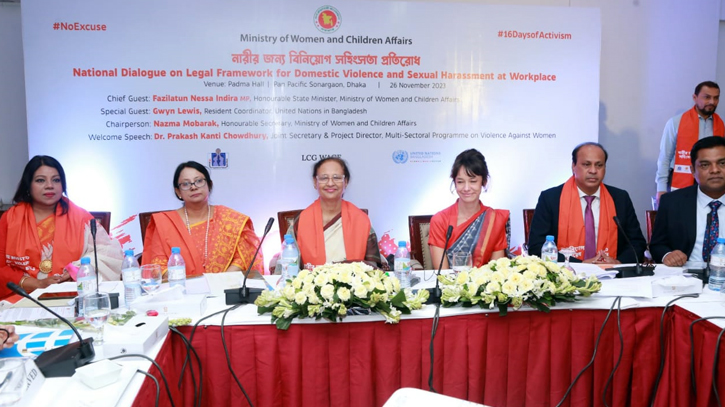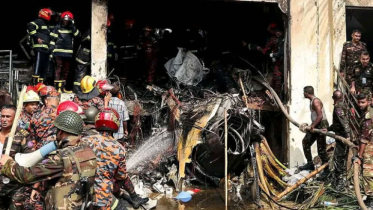
Photo : Messenger
The cost of violence in any society is enormous. The price we pay as a society, as a community, as a family, and as human beings is enormous. The effect of violence covers generations and drains resources on all levels. Investing in preventing gender-based violence is therefore not only the right but also the wise thing to do.
Swedish Ambassador H.E. Ms. Alexandra Berg von Linde said this as a special guest at a seminar titled ‘Invest to Prevent Violence Against Women and Girls’ held at the Pan Pacific Hotel in Dhaka on November 26.
The commencement of the 16-Days of Activism Against Gender-Based Violence seminar marked a significant collaborative effort by the Ministry of Women and Child Affairs, the United Nations Bangladesh, and the Local Consultative Group on Women Advancement and Gender Equality (LCG WAGE).
The seminar focused on pivotal discussions regarding the prevention of violence against women and girls, addressing issues such as discriminatory laws, workplace violence, and the necessity for safe spaces to foster women's leadership.
As the Special Guest, the UN Resident Coordinator emphasised the importance of passing legislation and ensuring robust implementation, stressing the critical need for adequate funding allocation coupled with mechanisms to track gender equality budget allocation.
Barrister Farzana Mahmood contributed a comprehensive research paper evaluating Bangladesh's current legal framework concerning domestic violence and workplace sexual harassment. This paper, drawing from recent studies by esteemed organisations like the ILO, UNFPA, and UN Women, highlighted both legal gaps and strengths, shedding light on necessary improvements.
A startling revelation from a 2015 survey showed that approximately 72.6 percent of married women in Bangladesh have faced domestic abuse. Despite the Domestic Violence (Prevention and Protection) Act of 2010, the Criminal Penal Code fails to classify domestic violence as a criminal offense. Recommendations focused on criminalising domestic violence, enhancing police force training, and engaging in broader consultations with various stakeholders for necessary legal amendments.
Addressing the seminar, State Minister of Women and Children Affairs, Ms. Fazilatun Nessa Indira, emphasised the need for cultural reshaping, stressing the essentiality of changing men's attitudes, stereotypes, and behaviours to reduce violence against women.
In an open discussion, participants highlighted the necessity for family-level interventions, cost assessments of gender-based violence (GBV) on the national budget, addressing patriarchal structures, and investing in research to mitigate violence against women and girls.
Gitanjali Singh, Country Representative of UN Women, stressed the significance of annual law monitoring and timely amendments, advocating for increased global investments to prevent gender-based violence.
Ms. Kristine Blokhus, Country Representative of UNFPA, commended the Ministry of Women and Children Affairs for their strides in amending domestic violence laws and initiating legislation on sexual harassment. She emphasised focusing discussions on women's dignity, safety, and empowerment while addressing violence against women.
Najma Mubarak, Secretary of the Ministry of Women and Children Affairs, affirmed the importance of prioritising research and development, declaring that the seminar's recommendations would guide future actions.
The session, moderated by Dr. Prakash Kanti Chowdhury, facilitated the convergence of distinguished attendees like Swedish Ambassador H.E. Ms. Alexandra Berg von Linde, Gitanjali Singh, Country Representative of UN Women, and Kristine Blokhus, Country Representative of UNFPA. The seminar highlighted the vital role of the 16-day programme in preventing violence against women and girls in Bangladesh, offering a collaborative platform for stakeholders to address challenges and work towards fostering a safer, more inclusive society.
Messenger/Fameema








